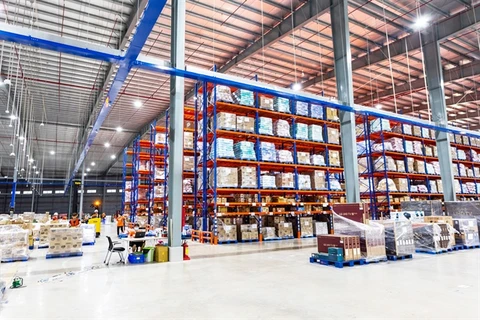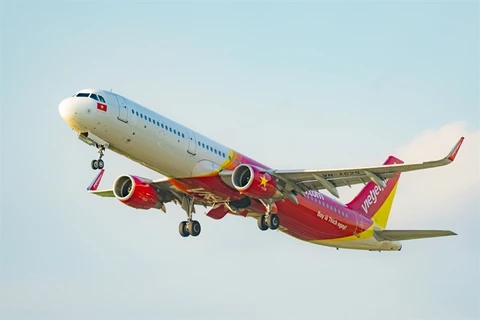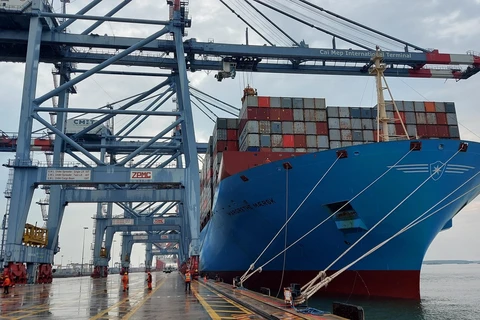 Minister of Industry and Trade Tran Tuan Anh addresses the Vietnam Logistics Forum 2020 (Photo: VNA)
Minister of Industry and Trade Tran Tuan Anh addresses the Vietnam Logistics Forum 2020 (Photo: VNA)
Hanoi (VNA) – Measures to reduce logistics costs have received great attention from the Government and the business community to enhance the competitiveness of Vietnamese products.
Although many policies have been issued over the past years, Vietnam has still seen many bottlenecks in cutting down logistics costs, heard the Vietnam Logistics Forum 2020 held on December 26 by the Ministry of Industry and Trade (MoIT) in collaboration with Hanoi authorities and the World Bank (WB).
Logistics costs remain high
According to Dang Thi Minh Phuong, Chairwoman of Minh Phuong Logistics, logistics costs in Vietnam remain high, partly because the infrastructure system has yet to suit the development of the economy. Meanwhile, limitations in the use of daily rent services are also a factor pushing the costs up.
Underlining the unequal competition between domestic and foreign firms, Phuong noted that in many countries like Japan and the Republic of Korea, businesses have received great support to invest abroad, but domestic enterprises have yet to receive enough assistance.
“Low profits and high costs have led to unequal competition between domestic and foreign companies. At the same time, domestic service companies are competing fiercely with each other by cutting down their prices, resulting in modest profits. This is currently a problem of logistics firms,” she said.
Statistics from US’s survey company Armstrong & Associates showed that logistics costs in Vietnam are equal to 20.9 percent of the country’s GDP, much higher than that in other countries in the region such as China, Malaysia, Thailand and Singapore, doubling that in developed countries, and far above the average ratio in the world, at 14 percent.
In the costs, transportation fee is high, making up 30-40 percent of the price of a product, while the ratio is only 15 percent in other countries. This has lowered the competitiveness of Vietnamese products.
Vu Tien Loc, President of the Vietnam Chamber of Commerce and Industry (VCCI), held that three major problems leading to high logistics costs include infrastructure, administrative procedures, and connections between domestic and foreign businesses.
Synchronism from planning
Vietnam has about 400,000 logistics firms, but only 10 percent of them are large-scale, and the rest are small and medium-sized enterprises and even micro-sized firms, with limited capacity in terms of finance and technological connections.
Phung Tien Toan, Chairman of the Board of Director of Interserco, held that although the number of logistics centres has risen fast, the majority of them are small with few means of transportation.
Therefore, to meet the economic development demand, Toan suggested that the State should devise support policies for the firms in terms of fee and tax, while providing them with special policies in construction.
Meanwhile, Le Quang Trung, Deputy General Director of the Vietnam Marine Corporation, the reduction of logistics fees is not merely cutting down the price of stages but it needs a comprehensive and synchronous solution on the basis of information technology and a standardised process.
He stressed that “time is money,” thus it is necessary to reduce the fees for ship docking, storage and transporting to meet the demand of production in factories, thus enhancing the competitiveness.
Secretary of the Hanoi Party Committee Vuong Dinh Hue addresses the forum (Photo: VietnamPlus)
Vietnam has set an annual growth target of 15-20 percent for the logistics sector, making up 8-10 percent of the country’s gross domestic product (GDP). Besides, logistics costs are also expected to reduce, equivalent to 16-20 percent of the GDP, while the country’s ranking in the Logistics Performance Index (LPI) is hoped to be at the 50th position or higher.
To this end, Deputy Prime Minister Trinh Dinh Dung asked ministries and sectors to focus on completing regulations, mechanisms and policies related to logistics, while mobilising resources and seeking solutions to cut down costs and promote the growth of logistics in all aspects of road, waterway, railway, airway, and in each region and locality.
He also underlined the need for comprehensive solutions in terms of fees, taxes and customs, thus shortening time and enhancing quality, reducing costs for logistics activities.
The Deputy PM also requested ministries and sectors to review their planning and plans to ensure connectivity in transportation infrastructure.
Planning in industrial, agricultural production, import-export activities as well as socio-economic development in localities should also remain connected, thus making a system of logistics centres, ports and bonded warehouse, he said./.























